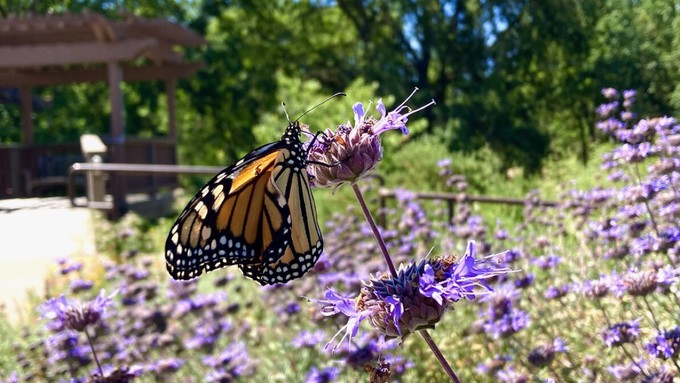
Order plants online, then pick up at Rancho Cordova nursery

A monarch butterfly pauses on the blossom of a salvia clevelandii at the Cosumnes Preserve. Photo courtesy Robin Rogerson via Sac Valley CNPS
In time for fall planting, the Sacramento Valley chapter of the California Native Plant Society (CNPS) is hosting its online fall plant sale at its nursery, starting at noon Wednesday through Sunday, Sept. 14-18.
Orders are available for pickup on two Sundays, Sept. 25 and Oct. 4. The demonstration gardens also will be open for viewing; see website for availability.
Also known as Elderberry Farms, Sac Valley CNPS Nursery and Gardens are located at Soil Born Farms’ American River Ranch, 2140 Chase Drive, Rancho Cordova.
Fall is the best time to transplant most native plants, especially shrubs, trees and perennials. It allows them months (hopefully with rain) to put down roots and get established before the stress of summer heat next year.
“Native plants are not only beautiful and climate adaptable, but they also feed and shelter birds, bees, butterflies and other pollinators,” says Chris Lewis, the nursery’s longtime director.
Gardeners gravitate towards native plants, too; they naturally use less water. Survival of our dry summer weather is stamped into these plants’ DNA. Many varieties need little if any summer irrigation.
Not only do native plants save water compared to traditional lawn-based landscape, they support local wildlife. Providing flowers and often seeds or berries, native plants offer food for pollinators and birds; that’s something turf never does.
Among the native favorites offered by the nursery: Monkeyflower, buckwheat, lupine, penstemon, salvias, asters, redberry, mountain mahogany and, of course, elderberry.
For full details and plant list: https://www.sacvalleycnps.org/plant-sales/.
Comments
0 comments have been posted.Sacramento Digs Gardening to your inbox.
Sites We Like
Garden Checklist for week of July 21
Your garden needs you!
* Keep your vegetable garden watered, mulched and weeded. Water before 8 a.m. to reduce the chance of fungal infection and to conserve moisture.
* Feed vegetable plants bone meal, rock phosphate or other fertilizers high in phosphate to stimulate more blooms and fruiting. (But wait until daily high temperatures drop out of the 100s.)
* Don’t let tomatoes wilt or dry out completely. Give tomatoes a deep watering two to three times a week.
* Harvest vegetables promptly to encourage plants to produce more. Squash especially tends to grow rapidly in hot weather. Keep an eye on zucchini.
* Pinch back chrysanthemums for bushy plants and more flowers in September.
* Remove spent flowers from roses, daylilies and other bloomers as they finish flowering.
* Pinch off blooms from basil so the plant will grow more leaves.
* Cut back lavender after flowering to promote a second bloom.
* It's not too late to add a splash of color. Plant petunias, snapdragons, zinnias and marigolds.
* From seed, plant corn, pumpkins, radishes, winter squash and sunflowers.